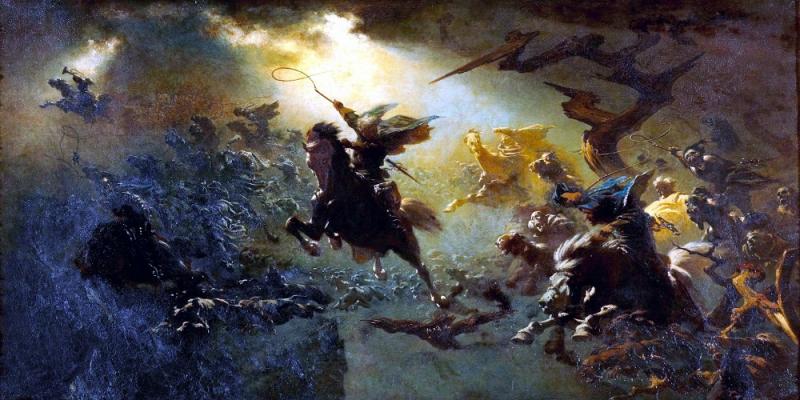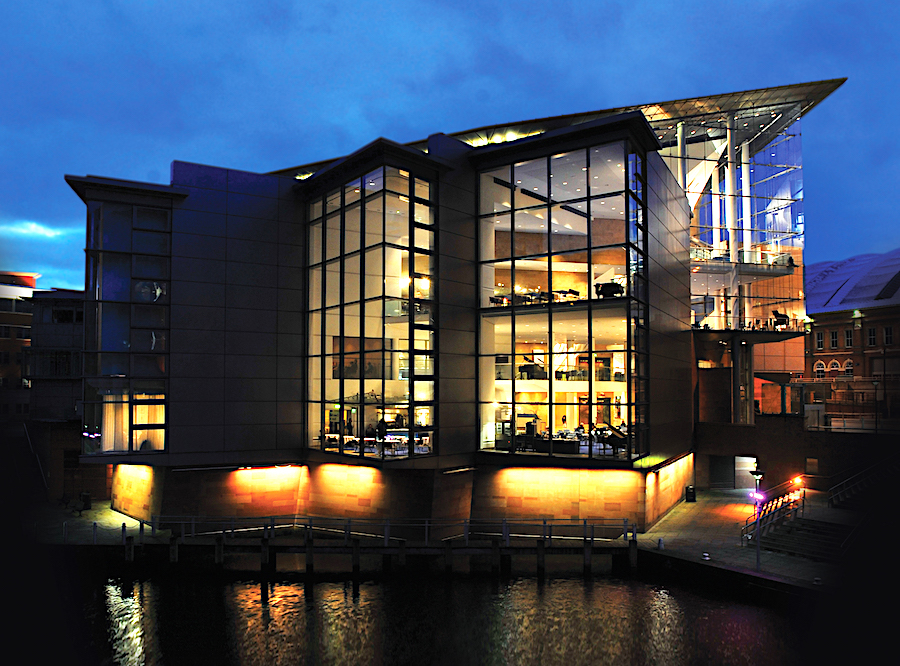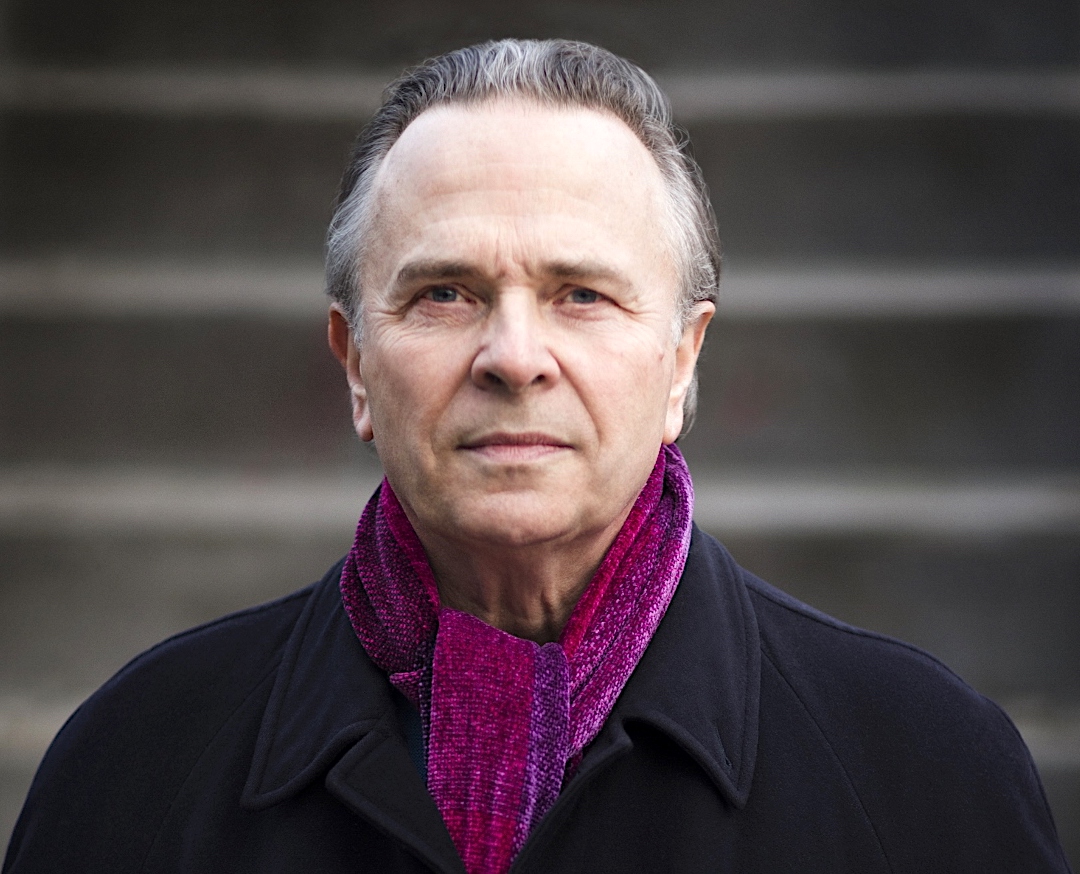Gurrelieder, Hallé, BBCPO, Elder, Bridgewater Hall, Manchester | reviews, news & interviews
Gurrelieder, Hallé, BBCPO, Elder, Bridgewater Hall, Manchester
Gurrelieder, Hallé, BBCPO, Elder, Bridgewater Hall, Manchester
Super-orchestra and choirs deliver Schoenberg's affirmation of the victory of love

It may not have had the symbolism of the Ariana Grande concert just down the road, but in its own way the joint Hallé/BBC Philharmonic performance of Schoenberg’s Gurrelieder said as much about Manchester as the rock jamboree did.
Sir Thomas Allen’s brief speech before the performance summed up a sense of determination not just to carry on but to let music speak as only it can. The work itself is, after all, an affirmation that love is eternal. It’s also one of those massive logistical operations that ensures it’s quite rarely performed: an orchestra of around 150, massive choral forces, particularly of men, and five soloists plus a speaker. The Hallé and BBC Philharmonic have formed a one-off "super-orchestra" before for big occasions, and they can do this sort of occasion proud. Led by Igor Yuzefovich, it made a many-splendoured sound. The Hallé Choir were joined by men from the London Philharmonic Choir and from the Edinburgh Festival Chorus.
 It’s almost conventional to describe Gurrelieder in terms of its dimensions, its supposed Romantic excess, or (if you are more of a Schoenberg enthusiast) its place in his compositional development, as the after-orchestrated later movements betray a more economic and "modern" style than those before. In this performance, the unity of the work and delicacy of much of its construction were among its most striking aspects. Sir Mark began its evocation of a summer’s evening with gentleness and the sweet string sound he loves to inspire from his players, while trumpet and horn solos softly pierced the texture. As the alternating songs for tenor (Waldemar, the royal lover of the story) and soprano (Tove, the object of his affections) built the work’s opening scene, the tones of lower wind instruments resonated beneath a sheen of sound that allowed Brandon Jovanovich and Emily Magee to sing with mellow refinement and generous warmth.
It’s almost conventional to describe Gurrelieder in terms of its dimensions, its supposed Romantic excess, or (if you are more of a Schoenberg enthusiast) its place in his compositional development, as the after-orchestrated later movements betray a more economic and "modern" style than those before. In this performance, the unity of the work and delicacy of much of its construction were among its most striking aspects. Sir Mark began its evocation of a summer’s evening with gentleness and the sweet string sound he loves to inspire from his players, while trumpet and horn solos softly pierced the texture. As the alternating songs for tenor (Waldemar, the royal lover of the story) and soprano (Tove, the object of his affections) built the work’s opening scene, the tones of lower wind instruments resonated beneath a sheen of sound that allowed Brandon Jovanovich and Emily Magee to sing with mellow refinement and generous warmth.
There were much more testing times to come, as the tension rose and the orchestral dynamic level dramatically followed. I expect the microphone-mediated version, to be heard on Radio 3 on Friday, will show them at their best, for neither let the tones of young love give way to bellowing over the accompanimental volume, but these were Wagnerian emotions of romance and the sound was big and rich.
The sense of foreboding crept in quickly, balanced by Sir Mark (pictured below by Benjamin Ealovega) with a great climax of romantic ecstasy and a sense of resignation that had almost the quality of Elgar’s writing to it. The orchestra was at its richest and most passionate in the intense and precisely articulated postlude to the first nine songs.

Alice Coote’s Wood Dove, telling the tale of the death of Tove perpetrated by Helwig, Waldemar’s queen, brought a new dimension altogether, with dramatic value added to every phrase (even every consonant). Like James Cresswell’s singing of the Peasant (who describes the ghostly night army condemned to ride with Waldemar in punishment for his cursing of God), and Graham Clark’s of the Fool (who continues the tale), these relatively brief contributions were vividly characterized and made their own impacts. Cresswell’s Peasant was a pretty noble farming lad, and Clark was, I think, the only soloist to get a gentle audience laugh (as the undead jester says "If it were not too late, I’d hang myself").
The huge orchestral forces were in full cry by this time, and the choirs, singing at their fullest, had work to do to make themselves heard; but the score is a wondrously many-layered thing and the wealth of detail coming through the soundscape was remarkable. As Sir Thomas Allen delivered the Speaker’s evocation of dawn and renewal (a challenge, in its touches of Sprechgesang, to which he rose magnificently), the playing was virtuosic and multi-splendoured, but never dissolved into sheer noise.
With no interval, the work was played with only the briefest break, and part-way applause would have been out of place. At the end, after a brief, awestruck silence, the 15-minute standing ovation came as testament to a musical experience that was immensely valued, a conductor who is very much loved, and a sense of unity that Mancunians feel with great strength right now.
rating
Explore topics
Share this article
The future of Arts Journalism
You can stop theartsdesk.com closing!
We urgently need financing to survive. Our fundraising drive has thus far raised £49,000 but we need to reach £100,000 or we will be forced to close. Please contribute here: https://gofund.me/c3f6033d
And if you can forward this information to anyone who might assist, we’d be grateful.

Subscribe to theartsdesk.com
Thank you for continuing to read our work on theartsdesk.com. For unlimited access to every article in its entirety, including our archive of more than 15,000 pieces, we're asking for £5 per month or £40 per year. We feel it's a very good deal, and hope you do too.
To take a subscription now simply click here.
And if you're looking for that extra gift for a friend or family member, why not treat them to a theartsdesk.com gift subscription?
more Classical music
 Hallé John Adams festival, Bridgewater Hall / RNCM, Manchester review - standing ovations for today's music
From 1980 to 2025 with the West Coast’s pied piper and his eager following
Hallé John Adams festival, Bridgewater Hall / RNCM, Manchester review - standing ovations for today's music
From 1980 to 2025 with the West Coast’s pied piper and his eager following
 Kaploukhii, Greenwich Chamber Orchestra, Cutts, St James's Piccadilly review - promising young pianist
A robust and assertive Beethoven concerto suggests a player to follow
Kaploukhii, Greenwich Chamber Orchestra, Cutts, St James's Piccadilly review - promising young pianist
A robust and assertive Beethoven concerto suggests a player to follow
 Robin Holloway: Music's Odyssey review - lessons in composition
Broad and idiosyncratic survey of classical music is insightful but slightly indigestible
Robin Holloway: Music's Odyssey review - lessons in composition
Broad and idiosyncratic survey of classical music is insightful but slightly indigestible
 Classical CDs: Wolf-pelts, clowns and social realism
British ballet scores, 19th century cello works and contemporary piano etudes
Classical CDs: Wolf-pelts, clowns and social realism
British ballet scores, 19th century cello works and contemporary piano etudes
 Bizet in 150th anniversary year: rich and rare French offerings from Palazzetto Bru Zane
Specialists in French romantic music unveil a treasure trove both live and on disc
Bizet in 150th anniversary year: rich and rare French offerings from Palazzetto Bru Zane
Specialists in French romantic music unveil a treasure trove both live and on disc
 Scottish Chamber Orchestra, Ibragimova, Queen’s Hall, Edinburgh review - rarities, novelties and drumrolls
A pity the SCO didn't pick a better showcase for a shining guest artist
Scottish Chamber Orchestra, Ibragimova, Queen’s Hall, Edinburgh review - rarities, novelties and drumrolls
A pity the SCO didn't pick a better showcase for a shining guest artist
 Kilsby, Parkes, Sinfonia of London, Wilson, Barbican review - string things zing and sing in expert hands
British masterpieces for strings plus other-worldly tenor and horn - and a muscular rarity
Kilsby, Parkes, Sinfonia of London, Wilson, Barbican review - string things zing and sing in expert hands
British masterpieces for strings plus other-worldly tenor and horn - and a muscular rarity
 From Historical to Hip-Hop, Classically Black Music Festival, Kings Place review - a cluster of impressive stars for the future
From quasi-Mozartian elegance to the gritty humour of a kitchen inspection
From Historical to Hip-Hop, Classically Black Music Festival, Kings Place review - a cluster of impressive stars for the future
From quasi-Mozartian elegance to the gritty humour of a kitchen inspection
 Shibe, LSO, Adès, Barbican review - gaudy and glorious new music alongside serene Sibelius
Adès’s passion makes persuasive case for the music he loves, both new and old
Shibe, LSO, Adès, Barbican review - gaudy and glorious new music alongside serene Sibelius
Adès’s passion makes persuasive case for the music he loves, both new and old
 Anja Mittermüller, Richard Fu, Wigmore Hall review - a glorious hall debut
The Austrian mezzo shines - at the age of 22
Anja Mittermüller, Richard Fu, Wigmore Hall review - a glorious hall debut
The Austrian mezzo shines - at the age of 22
 First Person: clarinettist Oliver Pashley on the new horizons of The Hermes Experiment's latest album
Compositions by members of this unusual quartet feature for the first time
First Person: clarinettist Oliver Pashley on the new horizons of The Hermes Experiment's latest album
Compositions by members of this unusual quartet feature for the first time

Add comment